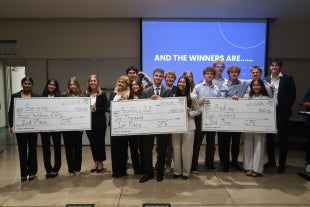Cal Poly and Stanford Project Awarded Grant to Support Student-Led Ethical Technology Research
Contact: Keegan Koberl
805-458-9302; kkoberl@calpoly.edu
Funding From Public Interest Technology University Network Supports Diversity, Equity and Inclusion in Technology Development
SAN LUIS OBISPO — Cal Poly students, faculty and staff collaborating on a project to bring together diverse scholars from around the world studying ethical technology have received a grant from the Public Interest Technology University Network (PIT-UN).
The project, “Learning Across Domains: Developing an Inclusive Pipeline of Global Experts Skilled at Examining Ethical Risks and Social Impacts of Artificial Intelligence and Advanced Technologies,” is run through Global Alliance on Ethics and Impact of Artificial Intelligence (GAEIA), a global research and innovation platform connecting academia, industry and intergovernmental organizations in confronting some of the most important opportunities and challenges facing humanity today.
The grant of over $89,000 is part of $2.3 million awarded to 18 universities and colleges in PIT-UN to bolster efforts to embed diversity, equity and inclusion in technology development. The announcement was made at the PIT-UN annual convention in New York City. Cal Poly is also providing funding for the project to bring the total amount to over $103,000.
Under the guidance of Cal Poly’s Elise St. John and Stanford University’s Søren Juul Jørgensen, GAEIA brings together experts and students — the next generation of the tech workforce — to cultivate a diversity of expertise and perspectives to the study of the risks, impacts and opportunities associated with technology use while building a robust pipeline of global experts skilled at working collaboratively with colleagues across disciplines.
GAEIA was founded by Juul Jørgensen from Stanford’s Center for Human Rights and International Justice in response to growing concerns about the unexamined use of technology across sectors and the relatively limited perspectives currently considered in these dialogues. Juul Jørgensen recruited a global team of over 65 cross-disciplinary doctorate and advanced-level students to examine the ethical considerations and impacts of technology use in the financial sector. The project was officially launched in March 2021 with the help of St. John, research and academic strategist for the Cal Poly DxHub, and six Cal Poly students contributed to the substantive research of the project while also supporting project management activities.
“Since the launch of that first cohort, many of the 65-plus students have either graduated from their doctoral programs, enrolled in doctoral or professional academic programs, or entered positions within industry,” Juul Jørgensen said. “The professional connections and collaborative learning have been invaluable and play an important role in advancing the next generation of cross-disciplinary leaders trained in the ethical and social impacts of advanced technology use.”
Deb Donig, assistant professor of English, co-founder of the Cal Poly Ethical Technology Initiative and former recipient of the PIT-UN grant, was invited to represent Cal Poly at the official announcement of the grant winners in New York City.
“At Cal Poly, we train students who will compose a new workforce, and it is vital that we build a kind of education that includes thought from a diversity of perspectives and that elevates the importance of including diverse perspectives in the imagining process,” Donig said. “We build our visions for technologies out of the stories and the perspectives we know, and we encode the passions and positions — and biases and blind spots — in our designs.
“For that vision to be truly better, truly ethical, it must also be equitable, inclusive and mindful of the diversity of human experiences across space and time,” Donig continued.
“My experience at GAEIA has taught me how to work closely with people from diverse backgrounds and diverse disciplines, which has been invaluable in my career post-Cal Poly,” said Andrew Pereira, who graduated from Cal Poly in 2021 with a bachelor’s degree in philosophy, worked as a project manager for the project. “Working with GAEIA through the pandemic, climate disasters and other challenges that our world has been facing recently has created a sense of community that I did not think was possible through remote work.
“I appreciated the international aspect of the project and the diversity of the team — not only are we from all over the world, but we represent a wide range of disciplines and backgrounds,” he added.
St. John added, “The global perspectives represented bring important cultural and geopolitical considerations to our discussions on responsible digital innovation, and the diverse disciplinary perspectives and methodologies included enabling exciting new learnings at the intersection of so many disciplines. The PIT-UN funds will further support this commitment to cross-disciplinary learning with the hiring of Cal Poly students across colleges.”
About the Public Interest Technology University Network
The Public Interest Technology University Network is a partnership of 48 colleges and universities convened by New America, the Ford Foundation and the Hewlett Foundation. The network and challenge grants are funded through the support of the Ford Foundation, Hewlett Foundation, Mastercard Impact Fund, with support from the Mastercard Center for Inclusive Growth, The Raikes Foundation, Schmidt Futures and The Siegel Family Endowment. PIT-UN is dedicated to building the field of public interest technology through curriculum development, faculty research opportunities and experiential learning programs in order to inspire a new generation of civic-minded technologists and policy leaders. www.pitcases.org.


